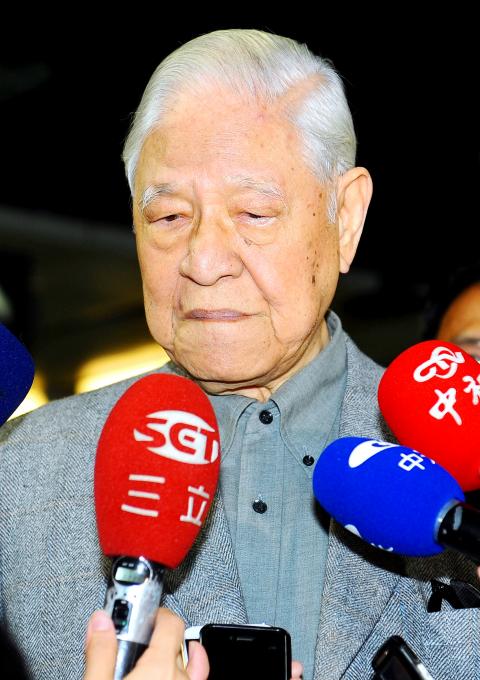Former president Lee Teng-hui (李登輝) yesterday called on President Ma Ying-jeou (馬英九) and Legislative Speaker Wang Jin-pyng (王金平) to take positive steps to ease tensions triggered by the ongoing student-led protest at the Legislative Yuan, including convening a citizens’ constitutional conference.
Wang, as speaker, should visit the students in the legislative chamber and initiate unofficial dialogues by offering his personal views and by listening to what the students have to say, Lee said at the Taipei High-Speed Rail Station in response to reporters’ questions.
Ma should do the same, the 91-year-old Lee said.

Photo: Chang Chia-ming, Taipei Times
Leaders should always have compassion and the patience to explain to the public whatever they do not understand, he said.
Student protesters should not be seen as rioters and those people who want their voices to be heard should not be labeled as “bad citizens,” Lee said as his eyes began to fill with tears.
Lee also questioned the government’s decision to use riot police to evict the students who had tried to occupy the Executive Yuan, saying the students were “very sympathetic.”
At one point, Lee became emotional and had to pause for a few moments before he could talk again.
Citing his experience in handling the “Wild Lily” student movement in 1990, in which student protesters demanded legislative reforms, Lee said he met with the protest leaders, telling them what he could do and could not do, and later organized a national affairs conference to develop a reform agenda.
The former president encouraged Ma and Wang to take the same active approach to resolve the long-running controversy over the cross-strait service trade agreement, which was signed in June last year.

MAKING WAVES: China’s maritime militia could become a nontraditional threat in war, clogging up shipping lanes to prevent US or Japanese intervention, a report said About 1,900 Chinese ships flying flags of convenience and fishing vessels that participated in China’s military exercises around Taiwan last month and in January last year have been listed for monitoring, Coast Guard Administration (CGA) Deputy Director-General Hsieh Ching-chin (謝慶欽) said yesterday. Following amendments to the Commercial Port Act (商港法) and the Law of Ships (船舶法) last month, the CGA can designate possible berthing areas or deny ports of call for vessels suspected of loitering around areas where undersea cables can be accessed, Oceans Affairs Council Minister Kuan Bi-ling (管碧玲) said. The list of suspected ships, originally 300, had risen to about

DAREDEVIL: Honnold said it had always been a dream of his to climb Taipei 101, while a Netflix producer said the skyscraper was ‘a real icon of this country’ US climber Alex Honnold yesterday took on Taiwan’s tallest building, becoming the first person to scale Taipei 101 without a rope, harness or safety net. Hundreds of spectators gathered at the base of the 101-story skyscraper to watch Honnold, 40, embark on his daredevil feat, which was also broadcast live on Netflix. Dressed in a red T-shirt and yellow custom-made climbing shoes, Honnold swiftly moved up the southeast face of the glass and steel building. At one point, he stepped onto a platform midway up to wave down at fans and onlookers who were taking photos. People watching from inside

Japan’s strategic alliance with the US would collapse if Tokyo were to turn away from a conflict in Taiwan, Japanese Prime Minister Sanae Takaichi said yesterday, but distanced herself from previous comments that suggested a possible military response in such an event. Takaichi expressed her latest views on a nationally broadcast TV program late on Monday, where an opposition party leader criticized her for igniting tensions with China with the earlier remarks. Ties between Japan and China have sunk to the worst level in years after Takaichi said in November that a hypothetical Chinese attack on Taiwan could bring about a Japanese

The WHO ignored early COVID-19 warnings from Taiwan, US Deputy Secretary of Health and Human Services Jim O’Neill said on Friday, as part of justification for Washington withdrawing from the global health body. US Secretary of State Marco Rubio on Thursday said that the US was pulling out of the UN agency, as it failed to fulfill its responsibilities during the COVID-19 pandemic. The WHO “ignored early COVID warnings from Taiwan in 2019 by pretending Taiwan did not exist, O’Neill wrote on X on Friday, Taiwan time. “It ignored rigorous science and promoted lockdowns.” The US will “continue international coordination on infectious